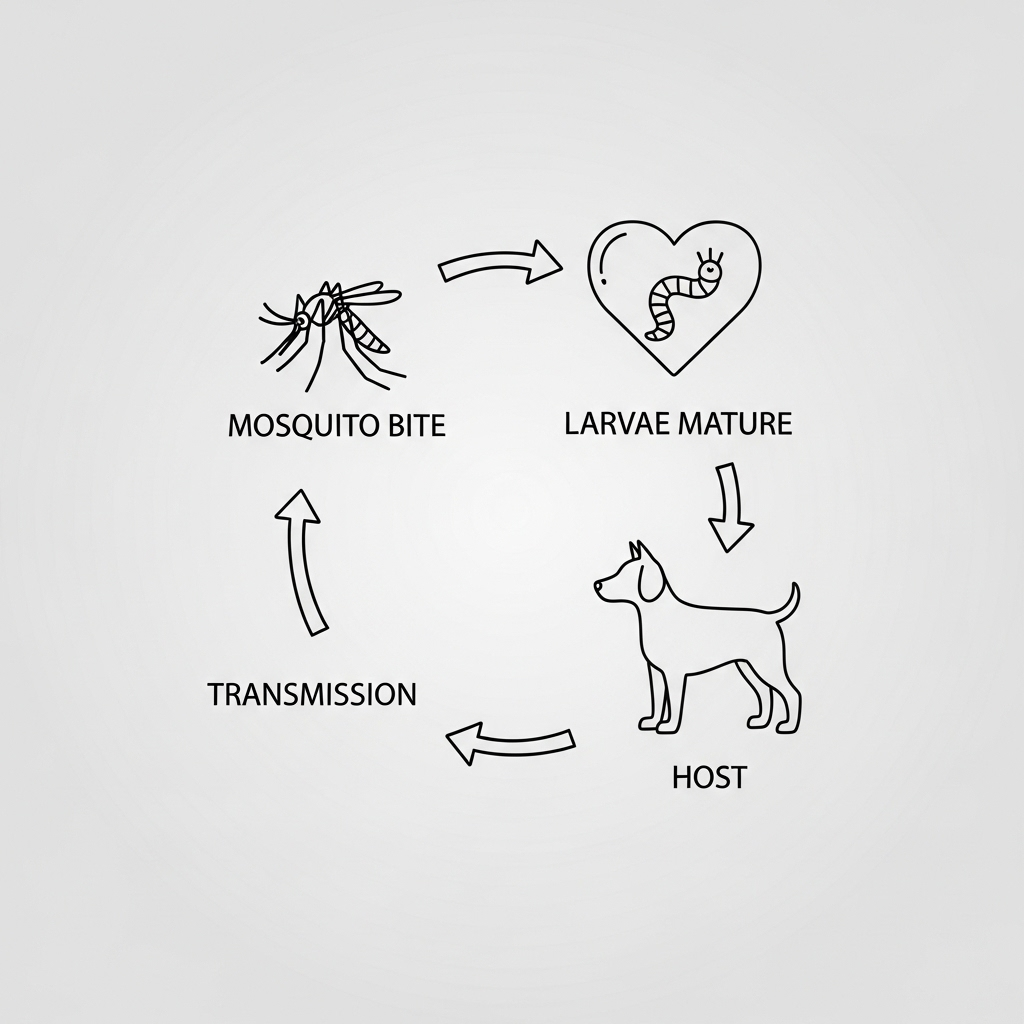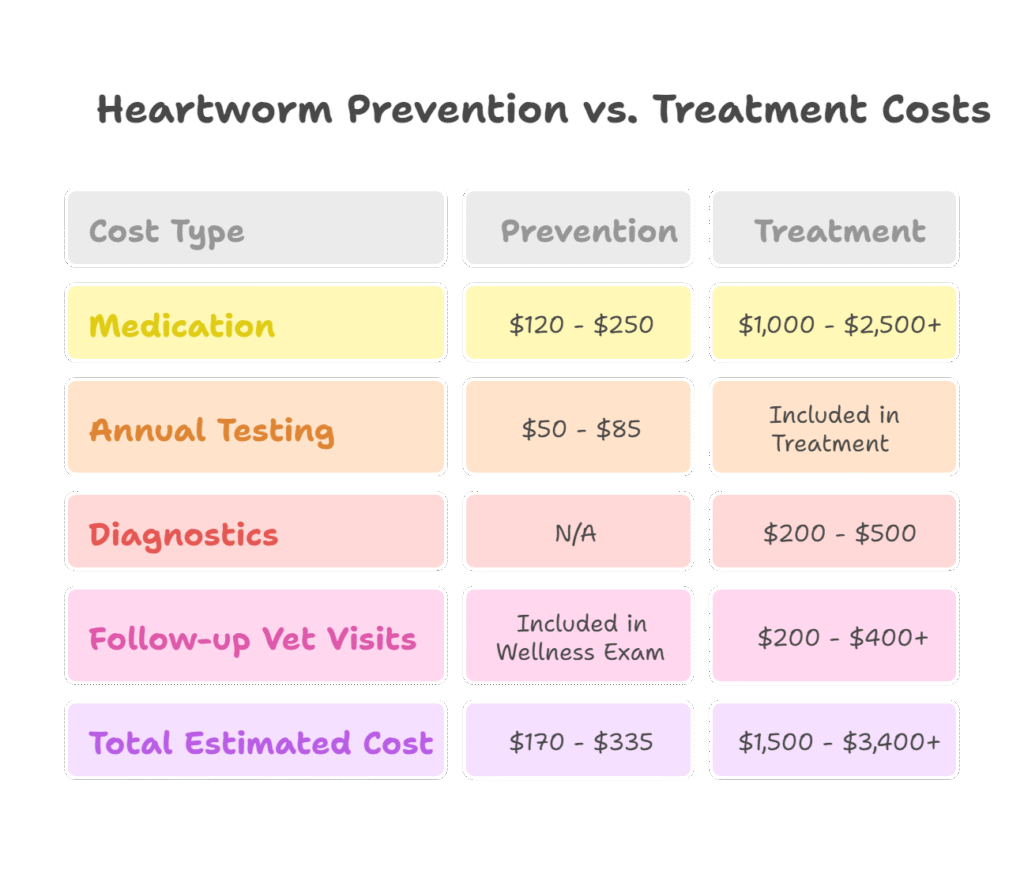Medical Disclaimer: This article is for informational purposes only and does not constitute medical advice. It is not a substitute for a consultation with a licensed veterinarian. Always seek the direct advice of your vet with any questions you may have regarding your pet’s health.
Table of Contents
Key Takeaways
Missing even one dose of heartworm prevention for dogs can leave your pet vulnerable to a devastating and potentially fatal disease. Heartworm disease is transmitted by mosquitoes and is a growing threat across Canada, not just in specific regions. The medication works by eliminating the larval stages of the parasite, so a missed dose creates a dangerous gap in protection. If you realize you’ve skipped a dose, contact your veterinarian immediately for guidance. The cost and difficulty of treating an active heartworm infection are immense compared to the simplicity and affordability of consistent, year-round prevention. Regular prevention is the only guaranteed way to protect your dog’s heart and lungs from irreversible damage.
A Moment of Panic: The Missed Dose Dilemma
It’s a feeling I know well from my time in the exam rooms in Ottawa: that sudden jolt of panic. You see the single, forgotten chewable tablet in the back of the cupboard or get a calendar reminder for a date that has already passed. Your heart sinks as you realise you’ve missed your dog’s monthly dose of heartworm prevention. Your mind starts to race with questions, and a wave of guilt washes over you. Am I a bad pet owner? Is my dog safe? Take a breath. This moment doesn’t define you, but what you do next is critical for your dog’s health.
What is Heartworm Disease? A Silent Threat Carried by Mosquitoes
Also see: https://doglifeexpert.com/dog-dental-chews-the-ultimate-guide-101/

Before we dive into the risks of a missed dose, it’s crucial to understand what we’re up against. Heartworm disease isn’t caused by a virus or bacteria; it’s caused by a parasitic worm called Dirofilaria immitis. The only way this parasite can infect your dog is through the bite of an infected mosquito. It’s a silent, insidious process.
The Heartworm Lifecycle: From Mosquito Bite to Heart Damage
When an infected mosquito bites your dog, it injects microscopic worm larvae into your dog’s tissues. These larvae mature over several months, eventually migrating through the bloodstream to their final destination: the heart, lungs, and associated major blood vessels. Once settled, they can grow into adult worms up to 30 centimetres long. According to the Merck Veterinary Manual’s detailed guide on canine heartworm disease, this entire process, from bite to adult worm, takes about six months. This is why consistent heartworm prevention for dogs is so essential; it targets the larval stages before they can become adults and cause real damage.
Why We See More Heartworm in Certain Parts of Canada
For years, many Canadians thought of heartworm as a “southern” problem. While the risk is certainly higher in areas with dense mosquito populations like Southern Ontario, Southern Quebec, Manitoba, and the Okanagan in B.C., this is no longer the whole story. With changing climates and more dogs travelling across borders, we’re now diagnosing heartworm in areas once considered low-risk. The Canadian Veterinary Medical Association warns that the threat is expanding, making heartworm prevention for dogs a national concern, not a regional one.
“Just One Missed Dose Can’t Hurt, Right?” Debunking a Dangerous Myth

I’ll never forget a case from a few years ago here in Ottawa. A lovely family with a Bernese Mountain Dog named “Moose” came in for their annual check-up. They had been diligent with their heartworm prevention for dogs for years. However, during a particularly chaotic move one summer, they admitted they had missed just one dose. They figured it wasn’t a big deal and got back on track the next month. When we ran Moose’s annual blood test, we were all devastated to find it came back positive. That one-month gap was all it took for an infected mosquito to strike.
The “Reach-Back” Effect: How Preventatives Work
This story highlights a common misunderstanding about how these medications function. Heartworm preventatives are not a shield that repels mosquitoes. Instead, they work retroactively. The dose you give on August 1st kills the vulnerable larvae that your dog may have been exposed to during the entire month of July. This “reach-back” or “reach-kill” mechanism is highly effective, but only if it’s given consistently. A missed dose creates a window where developing larvae can mature beyond the stage that the medication can eliminate.
Gaps in Protection Mean Real-World Risk
Missing a dose doesn’t just mean your dog is unprotected for that month; it means any larvae transmitted during that time have a chance to survive and mature into adults. By the time you administer the next dose, the worms may have grown too large for it to be effective. This is the gap that can lead to a full-blown, life-threatening infection. It underscores why year-round, uninterrupted heartworm prevention for dogs is the only way to ensure complete protection.
The 5 Most Critical Dangers of Inconsistent Heartworm Prevention for Dogs

Letting your guard down, even for a month, exposes your dog to significant and often heartbreaking consequences. Moose’s story is a testament to this. Here are the most critical dangers of inconsistent heartworm prevention for dogs.
1. Your Dog Becomes Vulnerable to a Potentially Fatal Disease
The most obvious danger is that your dog can get sick. Heartworm disease is a progressive and serious illness that affects the lungs, heart, and other organs. In the early stages, there are often no symptoms. As the worms grow and multiply, your dog might develop a persistent cough, become tired after light exercise, have a decreased appetite, and lose weight. In severe cases, it can lead to heart failure and death.
2. Treatment is Expensive, Difficult, and Painful
Compared to the low monthly cost of prevention, treating a heartworm infection is a long, arduous, and expensive ordeal. It involves a series of injections of a potent drug to kill the adult worms, strict cage rest for months (which is incredibly difficult for an active dog), multiple vet visits, and several rounds of blood work.
The cost in Canada can easily range from $1,500 to over $3,000, and the treatment itself carries risks, including potential complications from the dying worms. Preventing this disease is truly the most compassionate and financially sound choice.
3. It Can Lead to Irreversible Heart and Lung Damage
Even with successful treatment, the damage is often already done. The adult worms cause inflammation and scarring in the pulmonary arteries and heart. This can lead to chronic respiratory issues, reduced heart function, and a decreased quality of life long after the worms are gone. The goal of heartworm prevention for dogs is not just to avoid the treatment, but to prevent this permanent damage from ever occurring.
4. You Might Invalidate Your Pet’s Health Guarantees
Many pharmaceutical companies that produce heartworm preventatives offer a guarantee, agreeing to help cover the cost of treatment if a dog on their product still gets infected. However, this guarantee is almost always contingent on proof of consistent, year-round purchase and administration as prescribed by a veterinarian. If you skip doses, you void that guarantee, leaving you to bear the full financial burden of treatment.
5. The Rise of Resistant Heartworms
Perhaps one of the most concerning long-term threats is the development of drug-resistant heartworm strains. While not yet a widespread crisis in Canada, it’s a documented problem in other parts of the world. As explained in a comprehensive review on heartworm intervention in the journal Parasites & Vectors, inconsistent use of preventatives can contribute to this issue. When medication levels are not consistently maintained, it can allow stronger, more resilient larvae to survive and pass on their resistant genes. Diligent, year-round heartworm prevention for dogs is our best weapon in this fight.
A Practical Guide: What to Do if You’ve Skipped a Dose of Heartworm Prevention for Dogs

If you’ve just realised you’re late, don’t panic. Here’s a clear plan based on how long it’s been.
If You’re a Few Days Late
- Administer the Dose Immediately: Give your dog their preventative medication as soon as you remember.
- Resume Your Normal Schedule: Continue with the next dose on the regularly scheduled day. For example, if you give it on the 1st of every month and forgot until the 5th, give it on the 5th and then give the next one on the 1st of the following month as usual.
- Contact Your Vet: A quick call to your clinic is always a good idea to confirm this plan.
If You’ve Missed a Full Month or More
- Administer a Dose Immediately: Give a dose of the preventative right away.
- Call Your Veterinarian Immediately: This is the most crucial step. Your vet needs to know about the lapse in protection.
- Schedule a Heartworm Test: Your veterinarian will likely recommend a heartworm blood test. According to foundational texts like Blackwell’s Five-Minute Veterinary Consult, a test should be performed six months after the potential exposure (the missed dose) because of the worm’s lifecycle. Testing sooner might produce a false negative.
- Continue Monthly Prevention: Your vet will advise you to continue giving the heartworm prevention for dogs each month to eliminate any new larvae while you wait for the testing window. Recent research published in the Journal of the American Veterinary Medical Association confirms that restarting prevention even after a lapse significantly reduces the risk of adult infection.
At-Home Prevention Checklist (5-Minute Task)

- Set Multiple Reminders: To stay on schedule, use your phone calendar, a physical calendar, and even a sticker on the medication box. Set the reminder for a day or two before the monthly dose of heartworm prevention for dogs is due.
- Link It to a Memorable Date: Administer the dose on the first of every month, or on the same day you pay a specific recurring bill. Consistency is the most critical part of successful heartworm prevention for dogs.
- Buy in Bulk (If Possible): Purchase a 6-month or 12-month supply of your heartworm prevention for dogs directly from your veterinarian. This saves you trips and ensures you don’t run out unexpectedly.
- Store it Visibly: Keep the medication somewhere you see it daily, like next to the dog food container or your coffee machine. Storing your heartworm prevention for dogs in a visible (but pet-proof) spot is a great daily reminder.
- Record Each Dose: Immediately after giving the medication, mark the date on the box or in your calendar. Recording each dose of heartworm prevention for dogs is essential to avoid accidental double-dosing or future confusion about when the next one is due.
The Cost of a Mistake: Heartworm Treatment vs. Prevention in Canada
Seeing the numbers side-by-side makes the choice clear. The investment in consistent heartworm prevention for dogs is minimal compared to the financial and emotional cost of treatment.

Note: Costs are estimates and can vary significantly based on your location in Canada, the size of your dog, and the specific clinic.
People Also Ask: Your Top 5 Questions Answered
1. Does my dog really need heartworm prevention in the winter in Canada?
Yes, absolutely. The Canadian Veterinary Medical Association and most vets recommend year-round prevention. Mosquitoes can survive in protected microclimates (like garages, sheds, or underground parking) much longer than you’d think. Year-round dosing provides a safety net and ensures there are no gaps in your heartworm prevention for dogs.
2. Can I buy heartworm prevention for dogs online without a prescription?
No, and you shouldn’t. In Canada, heartworm medication requires a prescription from your veterinarian. This is for your dog’s safety. Your vet ensures your dog has a recent negative heartworm test before starting prevention, as giving it to an already-infected dog can cause a severe, life-threatening reaction.
3. What if my dog vomits after taking the chewable heartworm pill?
This is a great question. You need to contact your veterinarian. Depending on how long it has been since your dog ate the chewable, the manufacturer may advise giving another dose. Do not re-dose without consulting your clinic first.
4. Are the injectables better than the monthly pills for heartworm prevention?
There are 6-month and 12-month injectable options for heartworm prevention for dogs. They are excellent for owner compliance, as you don’t have to remember a monthly dose. However, the best preventative is the one that you and your vet decide is right for your dog’s lifestyle and health profile. Both the monthly and injectable options are highly effective when administered correctly.
5. Can my indoor dog get heartworm disease?
Yes. This is one of the most dangerous myths. I’ve personally treated dogs who rarely leave their apartment for heartworm. All it takes is one infected mosquito getting through an open door or a window screen. No dog is completely immune without effective heartworm prevention for dogs.
A Final Thought from Your Vet: Consistency is Your Dog’s Best Defence
As a veterinarian and a dog lover myself, I can tell you that few things are as preventable yet as devastating as advanced heartworm disease. The quiet consistency of a monthly chew or a twice-yearly injection is a small act of love that provides a powerful shield for your companion. It’s more than just medication; it’s peace of mind. It’s knowing you are doing everything you can to ensure your dog lives a long, healthy, and happy life by your side. Don’t let a simple, preventable parasite threaten that bond. Be consistent, be vigilant, and talk to your vet. Your dog is counting on you.




